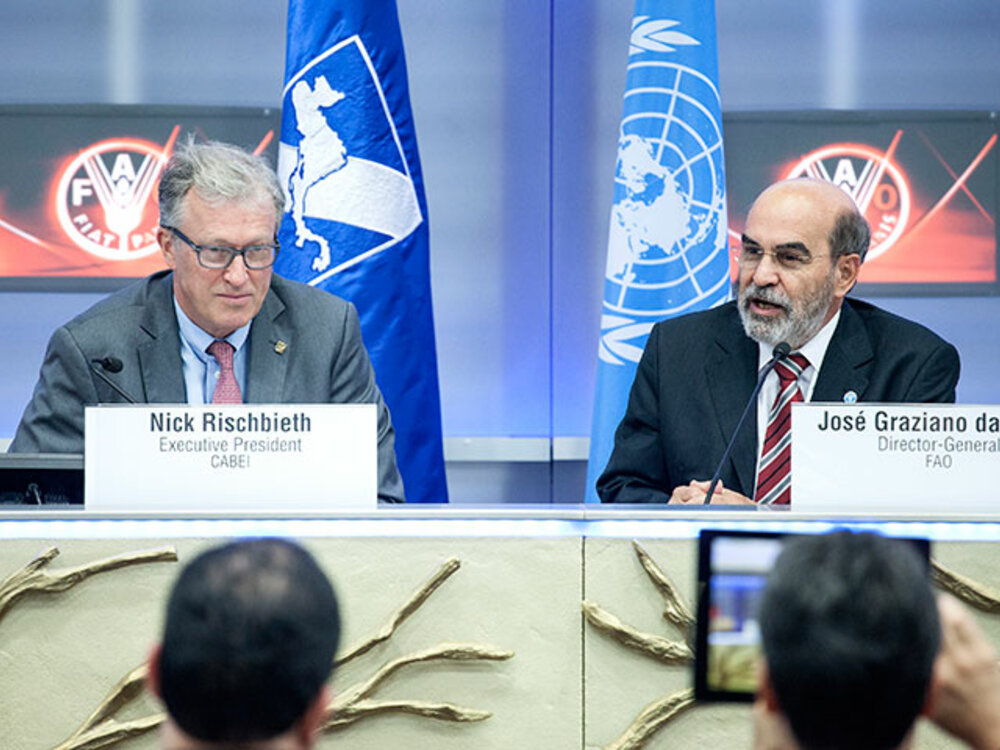CABEI President addresses FAO forum about the impact of El Niño on the Central American dry corridor

From 2010 to 2014, CABEI approved US$7.62 billion for development initiatives in its member countries; an estimated 67% of these include climate change adaptation and mitigation measures.
Tegucigalpa, June 30, 2016.- The President of the Central American Bank for Economic Integration (CABEI), Dr. Nick Rischbieth, was one of the invited speakers at a forum on “The Dry Corridor: Impacts and long term action priorities to increase food security and nutritional resilience,” organized by the United Nations Food and Agriculture Organization (FAO), the International Fund for Agricultural Development (IFAD) and the World Food Program (WFP).
The forum was inaugurated by FOA Director General José Graziano de Silva; the IFAD President, Kanayo F. Nwanze; and the WFP Executive Director, Ertharin Cousin.
In his presentation, President Rischbieth discussed how in recent years CABEI has increased its participation in projects related to food security.
Essential support for the region
CABEI has promoted important projects with an environmental focus: for example, US$216 million in financing to El Salvador for the Plan for Family Agriculture and Rural Entrepreneurship for Food and Nutritional Security (PAF); US$10 million to Honduras for the Sustainable Development Program for the Southern Region (EMPRENDESUR); US$10 million to Nicaragua for the execution of the Program to Promote Sustainable Agricultural Productivity (PFPAS); and US$48 million to Costa Rica for the construction, equipment and startup of the Regional Wholesale Market in Chorotega Area.
In addition, through non-reimbursable financial cooperation, the Bank supports the region’s governments to immediately deal with natural disasters caused by climate change, such as the pine bark beetles that have devastated approximately 60% of the pine tree ecosystem in Honduras.
The region’s current challenges require the generation of greater resilience capacity in the Dry Corridor. As the principal provider of multilateral support for the region’s development, CABEI will redouble its efforts and undertake coordinated actions with other fund sources to create innovative mechanisms that improve the quality of life in vulnerable areas.
In this regard, Dr. Rischbieth explained that during the five-rear period from 2015-2019, CABEI will continue to increase its participation in its focus area of Rural Development and the Environment, with the support of green funds, such as the Adaptation Fund, Global Environment Facility and the Green Climate Fund.
During his presentation, Dr. Rischbieth made it clear that CABEI’s role as a catalyst for funds is vital because it is an institution sought by fund providers to identify new projects.
Finally, the CABEI President declared that the Bank is taking the necessary measures to considerably reinforce its efforts in the climate change area. This includes new mechanisms to back and connect carbon offset markets, increased investment in environmentally-friendly agricultural production and innovative alliances to establish resilient cities and habitats. “We are reviewing our work in all sectors to ensure that all of our projects deal with the fundamental need to tackle the climate change issue by means of innovative financial instruments, with the support of the abovementioned green funds,” he concluded.
CABEI carries out such efforts in line with the actions defined in its 2015-2019 Institutional Strategy, “Integrating Sustainable Development and Competitiveness;” they are directly related with its cross-cutting axis of environmental sustainability.





